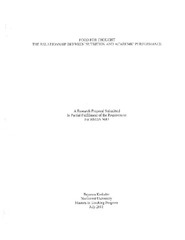| dc.contributor.author | Krekeler, Bryanna | en |
| dc.date.accessioned | 2017-10-02T22:47:16Z | |
| dc.date.available | 2017-10-02T22:47:16Z | |
| dc.date.issued | 2011-06 | en |
| dc.identifier.uri | archives.northwestu.edu/handle/nu/25769 | |
| dc.description.abstract | The media is constantly providing new information on brain food or ways to increase our metabolisms. This nutrition craze has even influenced schools to look at the nutritional value of the foods being served to students and educators are working on ways to improve the options offered. We are all aware of the importance of nutrition, but I wanted to look at the short-term effects of diet quality upon the academic performance of pre-adolescents. In this quantitative study, conducted at a suburban Seattle school, surveys were handed out to three afternoon mathematics classes on test days. The surveys involved information on what type of lunch and what specific foods the student had eaten during lunch. The type of lunch was then analyzed to see if any relationship exists between the quality of lunch and that student’s test score. A healthy eating index was used to provide a numerical value for each student’s diet at lunch. I was then able to use this numerical value to look at the correlation between the quality of student lunches and their academic performance in afternoon classes. The results of this study showed that students who brought lunch from home did slightly better compared to those who ate school provided lunches even though school provided lunches had a higher value on the healthy eating index scale. Both students who brought lunches from home and those that ate school provided lunches did significantly better academically compared to students who did not eat at all. No correlation was found between the quality of lunches eaten and academic performance when looked at as a class. However, when this relationship was looked at for each student over several testing days a correlation was found for the majority of the students. These results show that the quality of student lunches impact their academic performance in the afternoon. | en |
| dc.format.extent | v, 41 pages | en |
| dc.format.medium | PDF | en |
| dc.language.iso | en | en |
| dc.publisher | Northwest University | en |
| dc.rights | This original work is protected by copyright. Copyright is retained by the author(s). Works may be viewed, downloaded, or printed, but not reproduced or distributed without author(s) permission. | en |
| dc.rights.uri | http://archives.northwestu.edu/page/copyright | en |
| dc.subject | Sports and PE | en |
| dc.title | Food for Thought: The Relationship Between Nutrition and Academic Performance | en |
| thesis.degree.name | Master in Teaching | en |
| thesis.degree.level | Masters | en |
| thesis.degree.grantor | Northwest University | en |
| thesis.degree.discipline | College of Education | en |


 Maintained by the Northwest University Library
Maintained by the Northwest University Library